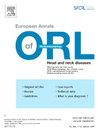舌下腺和小唾液腺癌手术:REFCOR 通过正式共识法提出的建议。
IF 1.9
4区 医学
Q2 OTORHINOLARYNGOLOGY
European Annals of Otorhinolaryngology-Head and Neck Diseases
Pub Date : 2024-11-01
DOI:10.1016/j.anorl.2023.11.011
引用次数: 0
摘要
摘要确定治疗原发性舌下腺和小唾液腺癌的适应症和切除方式,以及每个原发部位的具体特征:法国罕见头颈部肿瘤网络(REFCOR)成立了一个指导小组,该小组对Medline上发表的文献进行了叙述性综述,并提出了建议。然后由一个评级小组根据正式的共识方法对建议的遵守程度进行评估:结果:建议在对轻微唾液腺癌进行手术治疗前进行组织学检查(粘膜下活检)。建议根据解剖学因素、组织学类型和分级以及功能性后果进行最佳肿瘤边缘的手术治疗,必要时进行重建:结论:原发性小唾液腺和舌下腺癌的治疗以手术为主,切除边缘要宽。切除和重建的方式在很大程度上取决于肿瘤的位置、范围和组织学类型。本文章由计算机程序翻译,如有差异,请以英文原文为准。
Surgery of sublingual and minor salivary gland cancer: REFCOR recommendations by the formal consensus method
Objective
To determine the indications and modalities for resection in the management of primary sublingual and minor salivary gland cancer, and the specific features of each primary location.
Material and methods
The French Network of Rare Head and Neck Tumors (REFCOR) formed a steering group who drafted a narrative review of the literature published on Medline and proposed recommendations. The level of adherence to the recommendations was then assessed by a rating group, according to the formal consensus method.
Results
Histological evidence (submucosal biopsy) is recommended before surgical treatment of minor salivary gland carcinoma. Surgical treatment is recommended, with optimal oncologic margins, adapted to anatomical factors, histologic type and grade and functional consequences, with reconstruction if necessary.
Conclusion
Treatment of primary minor salivary and sublingual gland cancer is surgical, with wide resection margins. The modalities of resection and reconstruction are highly dependent on tumor location, extension and histologic type.
求助全文
通过发布文献求助,成功后即可免费获取论文全文。
去求助
来源期刊

European Annals of Otorhinolaryngology-Head and Neck Diseases
OTORHINOLARYNGOLOGY-
CiteScore
3.70
自引率
28.00%
发文量
97
审稿时长
12 days
期刊介绍:
European Annals of Oto-rhino-laryngology, Head and Neck diseases heir of one of the oldest otorhinolaryngology journals in Europe is the official organ of the French Society of Otorhinolaryngology (SFORL) and the the International Francophone Society of Otorhinolaryngology (SIFORL). Today six annual issues provide original peer reviewed clinical and research articles, epidemiological studies, new methodological clinical approaches and review articles giving most up-to-date insights in all areas of otology, laryngology rhinology, head and neck surgery. The European Annals also publish the SFORL guidelines and recommendations.The journal is a unique two-armed publication: the European Annals (ANORL) is an English language well referenced online journal (e-only) whereas the Annales Françaises d’ORL (AFORL), mail-order paper and online edition in French language are aimed at the French-speaking community. French language teams must submit their articles in French to the AFORL site.
Federating journal in its field, the European Annals has an Editorial board of experts with international reputation that allow to make an important contribution to communication on new research data and clinical practice by publishing high-quality articles.
 求助内容:
求助内容: 应助结果提醒方式:
应助结果提醒方式:


